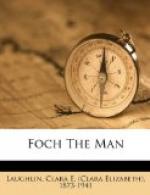High up among the clouds (almost 10,000 feet) is that Breach of Roland—200 feet wide, 330 feet deep, and 165 feet long. A good slice-out for a single stroke! And when Roland had cut it, he dashed through it and across the chasm, his horse making a clean jump to the French side of the mountains. That no one might ever doubt this, the horse thoughtfully left the mark of one iron-shod hoof clearly imprinted in the rock just where he cleared it, and where it is still shown to the curious and the stout of wind.
It is a pity to remember that, in spite of such prowess of knight and devotion of beast. Roland perished on his flight from Spain.
But, like all brave warriors, he became mightier in death even than he had been in life, and furnished an ideal of valor which animated the most chivalrous youth of all Europe, throughout many centuries.
With such traditions is the country round about Tarbes impregnated.
It has been suggested that the name Foch (which, by the way, is pronounced as if it rhymed with “hush”) is derived from Foix—a town some sixty miles east of St. Gaudens, near which was the ancestral home of the Foch family.
Whatever the relatives of Ferdinand may have thought of this as a probability, it is certain that Ferdinand was well nurtured in the history of Foix and especially in those phases of it that Froissart relates.
Froissart, the genial gossip who first courted the favor of kings and princes and then was gently entreated by them so that his writing of them might be to their renown, was on his way to Blois when he heard of the magnificence of Gaston Phoebus, Count of Foix. Whereupon the chronicler turned him about and jogged on his way to Foix. Gaston Phoebus was not there, but at Orthez—150 miles west and north—and, nothing daunted, to Orthez went Froissart, by way of Tarbes, traveling in company with a knight named Espaing de Lyon, who was a graphic and charmful raconteur thoroughly acquainted with the country through which they were journeying. A fine, “that-reminds-me” gentleman was Espaing, and every turn of the road brought to his mind some stirring tale or doughty legend.
“Sainte Marie!” Froissart cried. “How pleasant are your tales, and how much do they profit me while you relate them. They shall all be set down in the history I am writing.”
So they were! And of all Froissart’s incomparable recitals, none are more fascinating than those of the countryside Ferdinand Foch grew up in.
II
BOYHOOD SURROUNDINGS
The country round about Tarbes has long been famed for its horses of an Arabian breed especially suitable for cavalry.
Practically all the farmers of the region raised these fine, fleet animals. There was a great stud-farm on the outskirts of town, and the business of breeding mounts for France’s soldiers was one of the first that little Ferdinand Foch heard a great deal about.




